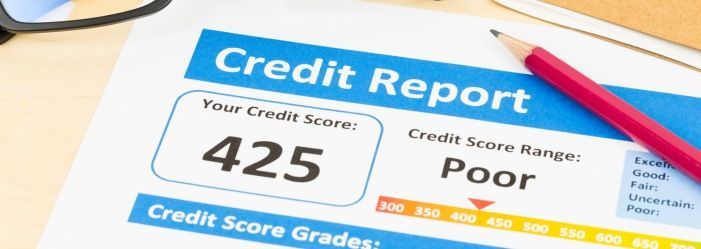Last Updated: March 25, 2024
Unexpected Drop in Credit Score!

Pacific Debt Relief is not a credit repair organization nor does our program aim to improve your credit score. The information below is for educational purposes to help consumers make informed decisions as it relates to credit and debt.
If you have noticed an unexpected drop in your credit score, there are a number of reasons that may cause your rating to change. Those reasons can range from a positive action - you paid off a loan, or to the very bad - someone has stolen your identity. In order to understand a sudden drop in your credit score, you need to understand what goes into creating your credit score.
If you would like to skip reading the article and speak directly to a debt specialist, click here.
Your Credit Score
Credit information is compiled by three main companies:
Experian,
TransUnion, and
Equifax. Not every creditor reports to all three, so your credit score may vary among them. Once your credit history is “old” enough and you have more than six months of reporting, two companies,
FICO and
VantageScore analyze five main categories and assign a score to your credit history. The scores are similar and range between 300 and 850. Excellent credit scores are above 740, average credit scores range from 680 to 739, poor credit scores are between 580 and 619, and bad credit scores are below 579.
The higher your credit score, the better rates you will get on loans and credit cards and the easier it is to qualify. A good credit score is a measure of how responsible you are at repaying loans. They are not a measure of financial health.
What Goes into Credit Scores?
There are five main factors that figure into your credit score. The first and most important is payment history. Next is credit utilization, followed by length of credit history, new credit, and credit mix. We will discuss each of those individually because any one of them may impact your credit history.
Learn more about your credit score from reading
The 5 Main Credit Score Factors You Need to Know
Payment History
Payment history represents a full 35% or ⅓ of your score. If you are late on payments or miss payments, your credit score will take a hit. The fastest way to improve your credit score is to pay your bills on time. If you miss a payment on a large loan like a mortgage, your credit rating will take more of a blow than if you miss a smaller credit card payment.
If you miss a payment by 30 days, lenders will notify credit reporting agencies. If you are sent to collections, this will be reported as well and has an even larger effect on your credit score.
If you have co-signed on a loan and the primary borrow has stopped paying, your credit score will see the effect.
Credit Utilization
Credit utilization is the second largest factor. At 30% it represents close to ⅓ of your credit score. Credit utilization looks at how much of your available credit you are using. This ratio looks at revolving loans like credit cards. Maxing out credit cards is statistically shown to result in missing payments or defaulting on loans.
If you take the total amount you owe on credit cards and divide by the total amount of credit available and then multiply that by 100, you will have a percentage (that should be less than 100). For instance, you have a credit limit of $5,000 and a balance of $3,000. Your credit utilization is 60%. Lenders prefer a credit utilization below 30%. According to FICO, the highest credit scores have a credit utilization of 7%.
If you made a large purchase using a credit card, you may see a short term drop on your score, even if you pay it off immediately, because your credit utilization changed. As soon as you pay it off, your credit score will recover.
For more information on ways to eliminate your credit card debt to bring down your credit utilization score, click here.
If your credit card company decreases your credit limit, your credit utilization will change and that can cause a lowered score.
Length of Credit History
The “age” of your credit history is the third largest factor, at 15% of your score. The older your credit history, the higher your credit score. If your score has suddenly dropped, you may have closed an account or paid off a loan.
If you no longer use a credit card and can keep it open without charges, consider leaving it open to age your credit history.
These three factors represent 80% of your credit score and most drops will be in these areas. If your credit score dropped for no apparent reason, look at these three categories for unexpected changes. This can be a sign that someone has stolen your identity and is taking out credit cards in your name.
New Credit
New credit - applying for loans or credit cards - represent 10% of your score. If you apply for a credit card (to save 10% on today’s purchases…) or are trying to qualify for a loan, the lender will do a “hard pull” on your report. This action usually creates a small, short term drop on your credit score.
Credit Mix
The final factor is credit mix. At 10% of your credit score, credit mix looks at the types of credit you have. Lenders like to see that you have an active mortgage or rental agreement, car loan, credit card, and other loans. This is considered healthy. All credit cards indicate too much reliance on credit cards and thus a higher lending risk.
A FICO or VantageScore drop may indicate that you closed a loan and your mix is not as healthy as lenders might like.
If you rent, you can have your monthly payments reported to the credit reporting agencies and it will help improve your credit score.
Why Did My Credit Score Go Down?
To summarize, there are a number of reasons that your credit score may have gone down.
These reasons include:
- Missing or skipping a payment
- Making a large purchase on a credit card
- Paying off a loan
- Closing an account
- Applying for credit cards or loans (hard pull)
- Changing your credit mix
- Errors on your credit report
- A bill was sent to collections
- A credit limit decrease
- Foreclosure or bankruptcy
- A co-signed loan is not being paid
Getting A Credit Report
You are entitled to one free report a year from each of the credit reporting agencies. Get one every four months and look for errors.
When Does Your Credit Score Go Up?
As you improve the five factors listed above, you will see an increase in your credit score. By paying your bills on time and paying down credit cards, you will see almost immediate positive reports.
If you have overused your credit cards and are having trouble making even minimum payments, you may need professional help from an expert debt settlement company like Pacific Debt, Inc.
Credit Score Ranges
Before trying to understand the reasons why your credit score dropped, it's helpful to know the different credit score ranges.
Scores generally fall into four main categories:
- Excellent (750+) - Qualify for the best rates on loans and credit cards
- Good (700-749) - Considered relatively low-risk borrowers
- Fair (650-699) - May still qualify for credit but likely at higher interest rates
- Poor (599 and below) - Will have trouble getting approved for new credit
For more context on your credit range, you can [check your credit score](link to credit score page) through services like Experian and Credit Karma.
Getting Your Credit Report
When your score drops unexpectedly, one of the first steps is to check for errors or suspicious activity in your credit reports.
You can get free annual credit reports from each bureau:
Be sure to review all sections of your credit reports closely, including:
- Personal information - Verify it is accurate
- Accounts - Confirm all open accounts are yours
- Inquiries - Check for applications you don't recognize
- Payment history - Look for any incorrect late payments
If you see any suspicious activity or accounts you don't recognize, follow the dispute process and consider placing a fraud alert.
Rebuilding Credit After a Drop
If your credit score saw a significant drop, here are some tips for improving it going forward:
- Contact creditors and request goodwill adjustments to remove late payments
- Pay down balances and keep credit utilization low
- Become an authorized user on someone else's credit card
For more guidance, see our credit repair tips that can help rebuild your score.
FAQs
Pacific Debt Relief
Pacific Debt is an award-winning debt settlement company. If you’d like more information on how to reduce your debt, we are happy to offer a free consultation. We will explain all your options and help you decide which is the best option for you. We can even refer you to trusted partners who better meet your needs.
If you have more questions, contact one of our
debt specialists today.
Pacific Debt Relief is not a credit repair organization nor does our program aim to improve your credit score. The information below is for educational purposes to help consumers make informed decisions as it relates to credit and debt.
✔ Accredited by Better Business Bureau with BBB A+ rating (4.93 rating and 1678 reviews)
✔ US News and World Reports and Bankrate ranked Pacific Debt Relief as one of “The Best Debt Relief Companies of 2024”
✔ 6.9 star rating by BestCompany.com (over 2379 client reviews)
✔ 4.8 star rating by TrustPilot based (over 1613 verified consumer reviews)
✔ ConsumerAffairs.com Accredited (over 544 verified reviews with an average rating of 5 stars)
✔ A Top 10 Rated Compan by TopTenReviews.com , ConsumersAdvocate.com and Top10debtconsolidation.com
✔ 4.6 star rating by Google (229 client reviews)
✔ 100% rating by SuperMoney (9 client reviews)
Reduce Your Credit Card Debt By Up to Half

BBB Reviews | 4.9/5.0 Rating









 Do Not Sell My Personal Information
Do Not Sell My Personal Information